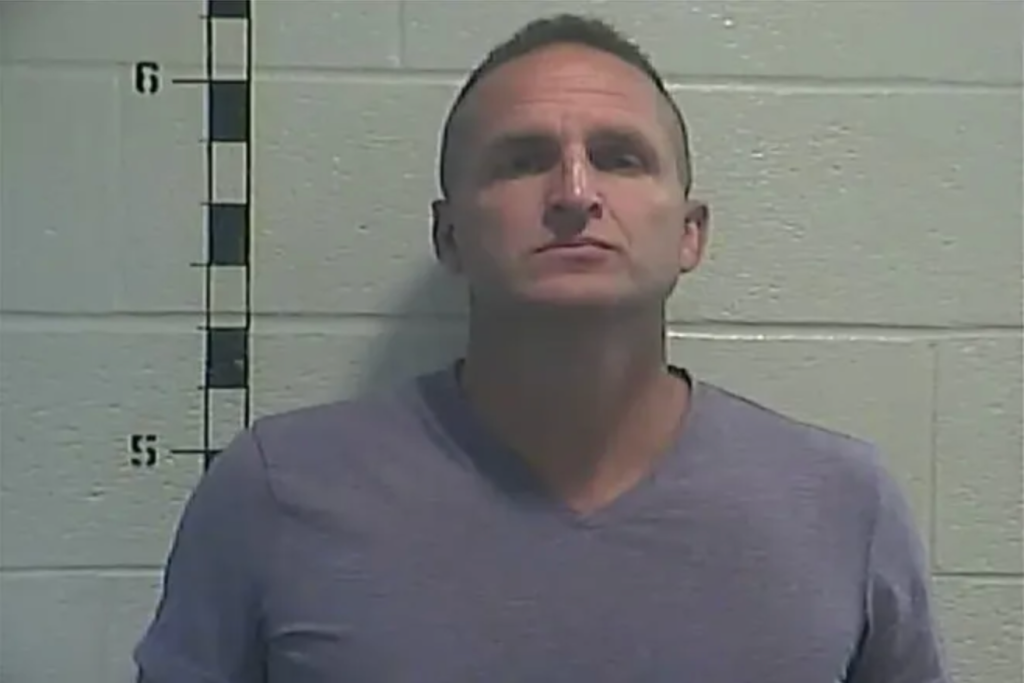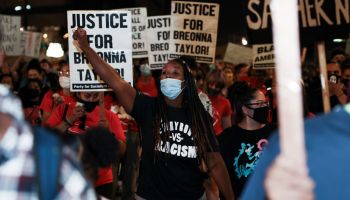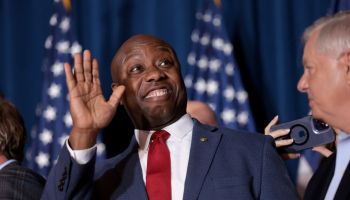UPDATED: 12:30 p.m. ET, Oct. 2 —
Kentucky Attorney General Daniel Cameron on Friday released the grand jury transcript from Breonna Taylor‘s case in the form of audiotapes.
“The recordings, released at 11:40 a.m. Friday, cover the grand jury’s sessions Sept. 21-23 and are parsed into 14 audio files, with witnesses’ personal information redacted because of concerns of threats that have been made to officials and officers,” the Louisville Courier Journal reported. The written transcript was expected to be released later in the day per a judge’s order.
A closer listen to the estimated 20 hours of audiotapes revealed that an investigator for Cameron’s office told the grand jury without any proof that the suspiciously obtained warrant for Taylor’s home was not served as a no-knock warrant and that officers identified themselves, contradicting the claim of Taylor’s boyfriend and at least 123 other witnesses.
Another portion of the audiotapes includes an interview with a detective who was on the scene at the time of the shooting in March and suggested police did nothing wrong.
Cameron also released a statement about an hour after the transcript was released.
“Juror deliberations and prosecutor recommendations and statements were not recorded, as they are not evidence,” he said. “I’m confident that once the public listens to the recordings, they will see that our team presented a thorough case to the Jefferson County Grand Jury,” Cameron said. “Our presentation followed the facts and the evidence, and the Grand Jury was given a complete picture of the events surrounding Ms. Taylor’s death on March 13th. While it is unusual for a court to require the release of the recordings from Grand Jury proceedings, we complied with the order, rather than challenging it, so that the full truth can be heard.”
This story will be updated as additional information becomes available.
Original story:
Cameron’s request for a week-long delay in releasing grand jury transcript was shot down by a judge, who on Wednesday instead ordered it to be made public much sooner. The grand jury transcript has played a central role in the fallout from last week’s decision to only indict one person over Taylor’s shooting, but not for Taylor’s shooting.
Jefferson Circuit Judge Ann Bailey Smith is giving Cameron until Friday at noon to release the documents after he said his office would need more time to redact certain portions of the document, like the names of grand jurors, according to the Lousiville Courier-Journal. In fact, it was one of those grand jurors who retained the services of a lawyer to file a motion earlier this week for the transcript to be released after learning that Cameron and his office may have concealed certain information in order to compel the grand jury to reach a decision to their liking.
Ben Crump, one of the lawyers representing Taylor’s family, said Tuesday that he expected the entire transcript to be released and not just parts edited to fit Cameron’s narrative.
“Since the grand jury decision was announced, we’ve been saying that Daniel Cameron clearly failed to present a comprehensive case that supported justice for Breonna. That conclusion is supported by the grand juror who came forward to say that the attorney general misrepresented the grand jury’s deliberations,” the civil rights attorney said in a statement. “We fully support the call to release the entire proceeding transcript as the only way to know what evidence was presented and how the grand jury instructions led to this outcome. In America, law-abiding citizens — including Black citizens — have the right to live peacefully in their homes, without police breaking down their doors in the middle of the night, and they have a right to protect themselves and their property from intruders. The police cannot claim their use of force was justified when they wrongly broke into Breonna’s apartment in the first place. We urge the Attorney General to release a COMPLETE and UNEDITED copy of the recording, along with any and all evidence in Bre’s case.”
Original story:
The development came amid nationwide protests over the decision to only charge one of the three police officers involved in shooting with wanton endangerment for shooting bullets that hit another apartment instead of for those that struck and killed Taylor in her own home March 13.
“The full story and absolute truth of how this matter was handled from beginning to end is now an issue of great public interest and has become a large part of the discussion of public trust throughout the country,” Kevin Glogower, the unnamed grand jury member’s lawyer, wrote in the motion that was filed Monday afternoon.
The grand juror in question is seeking permission to discuss freely what was presented to the grand jury less than a week after Cameron defended the decision to only charge Brett Hankison — who had already been fired from the Louisville Metro Police Department — while clearing Sgt. Jonathan Mattingly and detective Myles Cosgrove, who all fired their guns a total of at least 30 times.

Pictured: Brett Hankison | Source: Shelby County Sheriff’s Department
According to the motion, the grand juror specifically wants to publicly address “any potential charges and defendants presented or not presented.”
Taylor’s family and their lawyers have said that any charges less than manslaughter are unacceptable.
After a judge read the grand jury’s decision last Wednesday, Cameron held a press conference and blamed Taylor’s boyfriend for getting her killed, not the officers who botched the execution of a suspiciously obtained no-knock warrant in search of a suspect who was not even at Taylor’s apartment.
When police knocked Taylor’s door off the hinges, her boyfriend, Kenneth Walker, suspected burglars, got his gun he’s legally permitted to own and fired a shot toward the door that hit Mattingly. Therefore, Cameron said, “Mattingly and Cosgrove were justified in their use of force after having been fired upon by Kenneth Walker,” Cameron said during his press conference.
Furthermore, Cameron said he relied on the word of a single witness who told his office that he or she heard police knock on Taylor’s door and announce themselves before the shooting started on that fateful night. But at least 12 other witnesses said they never heard anything.
Monday’s motion places additional doubt about how genuine Cameron and his office were in presenting their case to the grand jury.
The reported decision to release the grand jury transcript came as calls were growing louder for Cameron and his office to show the public how exactly the case was presented. Reacting to the decision last week, Crump said the indictment “doesn’t make sense” and that Taylor’s family was “outraged, they were insulted, and they were mostly offended.”
Additionally, the wanton endangerment charges only stem from the bullets that hit an apartment that had white people inside while there were no charges for endangering the lives of a Black family — including children — whose apartment was also hit by police’s gunfire.
Stanley David, who is Black, lived in the apartment directly above Taylor’s apartment and wondered why the shots that ripped through his home weren’t factored into last week’s charges. He said his young daughter, elderly mother, a child she was babysitting and that child’s father were also in the apartment at the time of the shooting.
“My apartment was hit too,” David told the Louisville Courier-Journal in an exclusive interview. “The bullet that came through my floor right in front of my bedroom door, if that bullet went through my bed, maybe I would have been dead too. I’m a human being too.”
Monday’s motion came hours after Vice News published Louisville Police bodycam footage purportedly recorded in the moments after the shooting.
Vice News published another video in which the Louisville SWAT Team told investigators it had “serious concerns about how the deadly raid was carried out.”
Hankison formally pleaded not guilty to three counts of wanton endangerment during his first court appearance on Monday. He was released soon after on $15,000 bail. Wanton endangerment is a Class D felony that carries up to five years in prison for each count.
SEE ALSO:
Breonna Taylor’s Black Neighbor Breaks His Silence: ‘My Apartment Was Hit Too’
What Did Kentucky AG Daniel Cameron Actually Present To The Breonna Taylor Grand Jury?
















